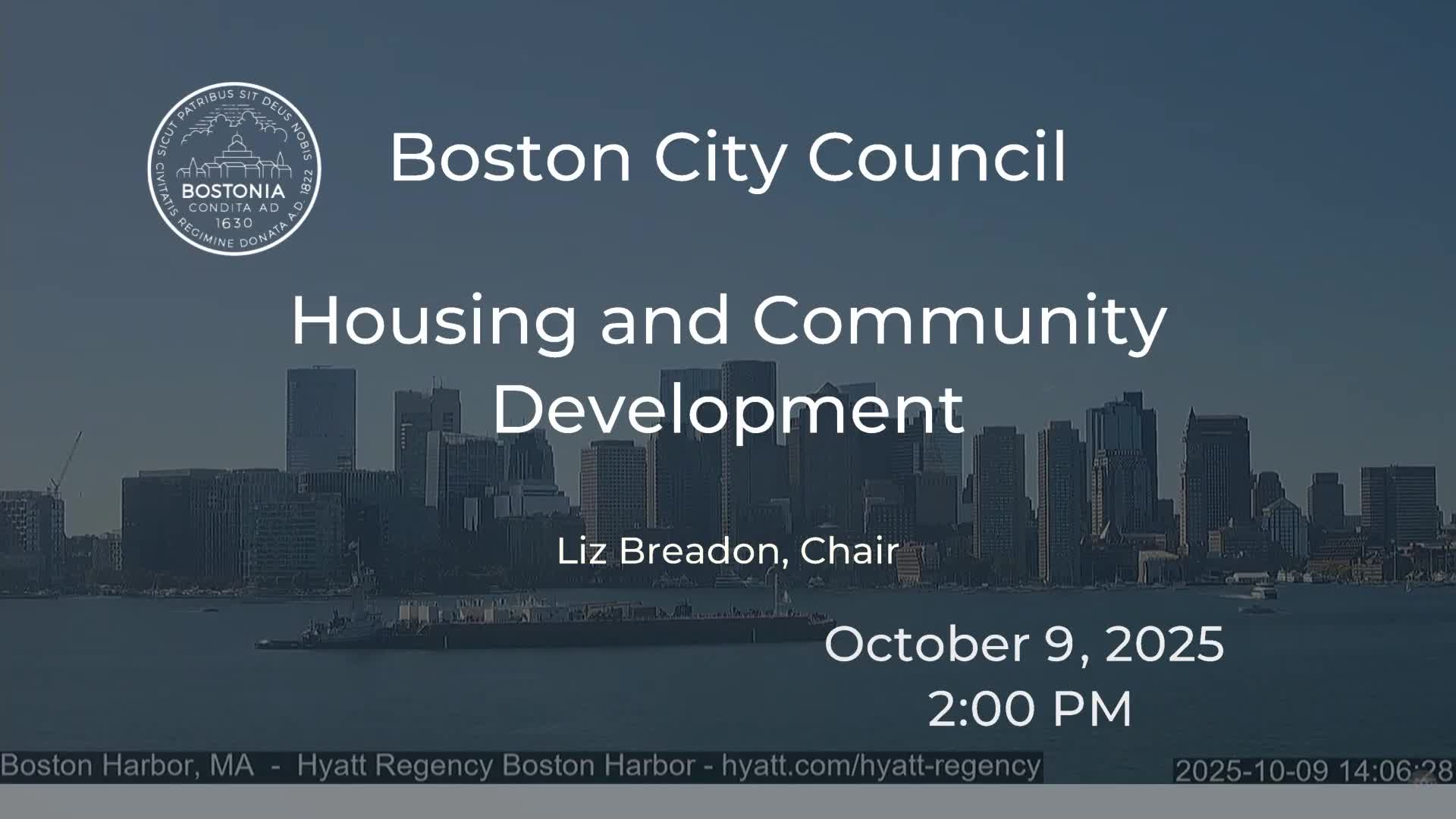Boston officials outline expanded homeownership programs, pipeline and funding limits
Get AI-powered insights, summaries, and transcripts
Subscribe
Summary
City housing officials told the Boston City Council on Oct. 9 that they have expanded homeownership programs and have a large pipeline of deed-restricted and market-linked homeownership units, but warned that federal ARPA funds and other temporary sources are fading and that sustaining current production will be challenging.
Boston housing officials told a City Council committee on Oct. 9 that the mayor’s office has increased programs to help first-time buyers and is supporting the creation of more affordable homeownership units, but cautioned the council that many of the recent gains rely on temporary funding and will be hard to sustain.
Mayor’s Office of Housing Chief Sheila Dillon and Karen Rebaza, director of the Boston Home Center, outlined city programs including down-payment and closing-cost assistance, educational classes and partnerships with nonprofits. "Homeownership and it's it's not just about buying a home, and we know that," Rebaza said during the committee hearing. Dillon credited council support with expanding the city’s work: "We have been trying very, very hard. We are not perfect, but your support has really helped us in neighborhoods," she said.
The hearing, convened by Councilor Liz Braden and requested by Councilors Julia Mejia, Brian Worrell and Erin Murphy, reviewed the administration’s work to expand pathways to ownership. Rebaza said the city’s Boston Home Center provides counseling, technical assistance and targeted programs such as a condominium buyer class (in partnership with Maha) and a savings-match program. She said program materials are available in 11 languages and described a credit-boosting partnership with Urban Edge.
Why it matters: Councilors framed the hearing as a fiscal oversight review of public expenditures tied to ownership investments. Council members and administration staff acknowledged that expanding homeownership can advance stability and wealth-building but that limited subsidy and rising construction costs complicate delivery.
Key facts presented - Median Boston home sale price cited by the administration: about $789,000. - Homeownership vacancy rate cited: 11 percent. - Racial disparities cited by the Mayor’s Office of Housing: homeownership rates of roughly 43% for white residents, 32% for Black residents and 18% for Latinx residents. - Since 2022 the administration reported assisting roughly 59 homebuyers through certain programs; the BHA First Home program had assisted 85 buyers as of the day before the hearing, the administration said, with 83% of those buyers identifying as BIPOC. - Production pipeline figures given by the administration: 526 new homeownership units completed since 2022, 368 units in construction, and "over a thousand" units in an affordable homeownership pipeline.
Officials named several financing and policy sources that support the work: Community Preservation Act funding, the Neighborhood Housing Trust, city inclusionary requirements (IDP/inclusionary development policy), the city’s own down-payment programs and ARPA funds deployed during the pandemic recovery. Rick Wilson, director of administration and finance at MOH, said these sources remain important but that some — notably ARPA and certain state programs — are temporary and that the Commonwealth Builder program is oversubscribed, which limits state-level subsidy available to the city.
Council questions and administration responses Councilors pressed the administration on sustainability and scale: how long the additional activity can continue without ARPA or new state revenue. Wilson said the city currently budgets roughly $4 million per year for down-payment and financial assistance; that figure can be supplemented with CPA and CDBG as available but that ARPA had materially increased the program’s capacity in recent years. The mayor’s office said it is already trimming per-household assistance in order to help more families with the same total dollars.
Officials also described efforts to produce more ownership units from city land and funding. Dillon and other planners said the city has issued RFPs for discounted parcels (Welcome Home Boston trials) that ask developers to propose lower-price ownership units and new building methods such as modular construction, and that the city requires Chapter 30B-compliant procurement on publicly owned parcels.
What the administration asked for City officials described the need for new and sustained revenue sources to continue at recent production levels and asked the council to keep supporting land resources, technical assistance and programs that make homeownership achievable for low- and moderate-income households.
Ending note Council members asked the administration for data the city holds on the geographic distribution of program-assisted buyers and for multi-year budget comparisons of amounts devoted to affordable rental versus affordable homeownership. The administration agreed to provide additional data and to follow up on pipeline and production numbers.
